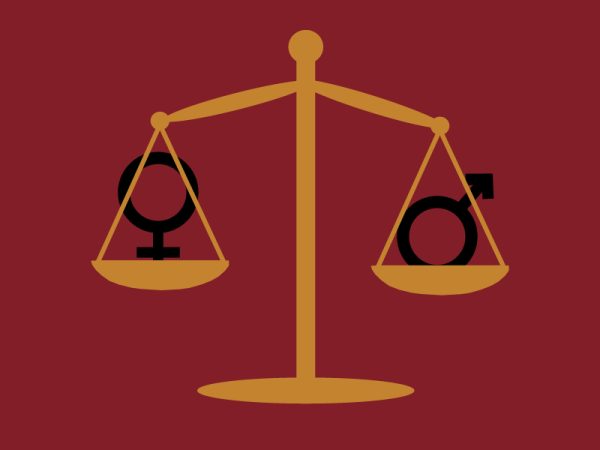Column: Consent matters, even if you’re a doctor
February 27, 2020
Earlier this month, the New York Times published an article from researcher Emma Goldberg, who had uncovered a startling medical practice: Doctors in certain hospitals across the U.S. routinely perform pelvic exams on women who are undergoing surgery without any medical necessity and without asking for permission. These exams are generally performed by residents during their training in obstetrics and gynecology, where they are encouraged to perform as many exams as they can to practice their skills.
A pelvic exam is an examination of a patient’s uterus, cervix and ovaries. It is generally performed on a fully conscious patient at a gynecological checkup to check for infections, cysts, cancers and other reproductive health conditions. Doctors recommend that women start receiving pelvic exams around age 21.
There have been efforts in many states to require healthcare providers to obtain explicit consent before performing such an invasive procedure on unconscious patients. Eleven states already have legislation to protect patients, but there has been pushback from medical professionals, who view such laws as an intrusion into the doctor-patient relationship.
The logic from many of the residents who perform these kinds of exams and the instructors who condone them are unsettling. Doctors assumed that women would refuse to let a student perform an exam on them and that letting women know that the exams could be performed would cause them unnecessary stress. They also worried that allowing patients the opportunity to refuse would prevent residents — especially male residents — from getting enough practice, therefore impeding their training.
However, the data does not support this assumption. A survey of more than 102 women at a clinic for pelvic disorders revealed that 62 percent of patients would consent to a medical student performing an exam on them while anesthetized, assuming that they were asked beforehand. While 5 percent would only agree to be examined by a female doctor, a meager 14 percent would refuse to be examined by medical students altogether. Contrary to popular belief, the women surveyed were happy to help medical students practice, but the vast majority still wanted to be told if a medical student would be present, and expected explicit consent to be obtained for the exams.
This is hardly a new problem. In 2018, the podcast “This American Life” released an episode partially focused on the topic. However, due to the covert nature of these pelvic exams, the vast majority of women who have undergone the procedure will never realize it. The exams do not show up on medical records, and women are not charged for them in most cases. Although the American Medical Association, the American College of Obstetricians and Gynecologists and the Association of American Medical Colleges have all denounced the practice, surveys of medical students indicate that it is still common. Additionally, since teaching hospitals are more likely to treat uninsured patients and patients on Medicaid, low-income women and women of color are disproportionately affected.
But even if women are informed of the procedure ahead of time, they are not always at liberty to refuse. As Goldberg reported in her piece, some healthcare providers will strongarm patients into agreeing to the exams by refusing to provide treatment until they consent. Even women who are seeking treatment for unrelated procedures, such as abdominal surgery, may be subject to the procedure.
Additionally, as these unconsenting exams are performed far more frequently on low-income women, there may not always be another provider they can turn to. In rural areas, where many hospitals are struggling to stay open, the next option may be several hours away.
The defense from medical professionals is that these exams are essentially harmless — that what women don’t know won’t hurt them. However, the response from the general public proves that this is not necessarily true. For one woman who received a pelvic exam while undergoing stomach surgery, learning that the exam had been performed brought up triggering memories of childhood sexual abuse. Another woman, who awoke from anesthesia halfway through her pelvic exam, described the experience as traumatic, akin to sexual assault. These exams cause trauma and harm — not just to the women who undergo them, but to the doctors who perform them.
A 2003 study from the American Journal of Obstetrics and Gynecology found that 90 percent of the students who had completed a clerkship in obstetrics or gynecology, or OB/GYN, had performed a pelvic exam on an unconscious patient. Just over half of those students believed it was important to get the patient’s consent for the procedure beforehand; in contrast, 70 percent of students who had not completed an OB/GYN clerkship believed consent for these procedures was important. Female medical students were also more likely than males to believe that obtaining consent before performing a pelvic exam was important.
The medical community has a long and shameful history of ignoring patients’ rights and autonomy in the pursuit of medical knowledge. The Tuskegee syphilis experiment and Henrietta Lacks’ story are perfect examples. These types of experiments have led to widespread mistrust of medical professionals — especially among people of color — for precisely this reason. People fear being exploited by doctors, poked and prodded by researchers who see them as a petri dish rather than a person. Promoting a culture in which patients’ autonomy is disregarded will only deepen the divide between medical professionals and the public.
It is time for the medical community to address the unsettling sense of ownership they have over women’s bodies. Patients are not guinea pigs. The quest for medical experience does not give anyone the right to bypass women’s autonomy, no matter how noble the cause is believed to be. Having a medical degree does not negate the fact that performing exams on an unconscious person without first asking permission is assault.
Medical ethics already require patients to receive informed consent before any procedure they undergo. It’s not that much to ask for them to uphold their promise to first, do no harm.


















